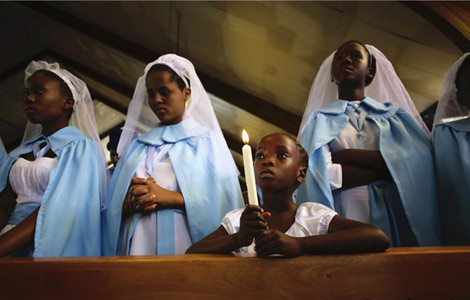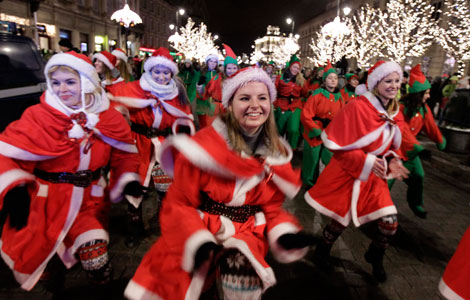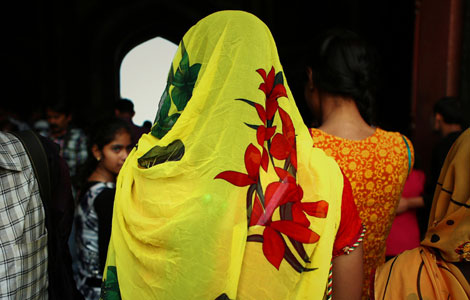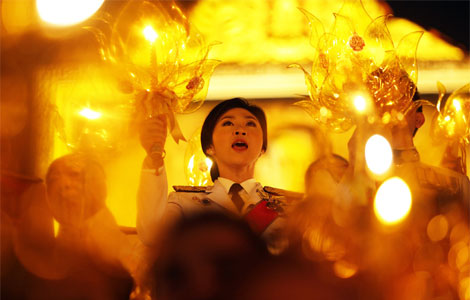

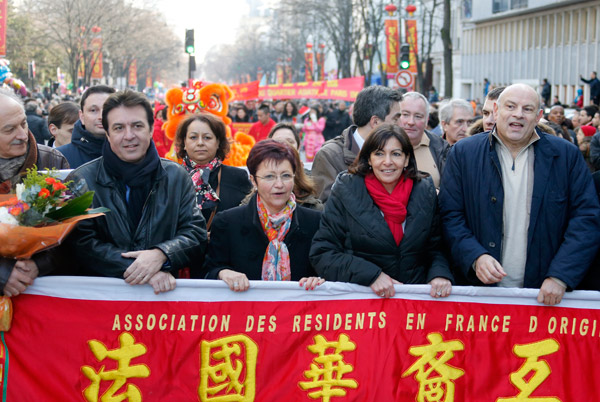 |
|
Paris Deputy Mayor and Socialist Party candidate for the 2014 municipal elections Anne Hidalgo (second right) and Jean-Marie Le Guen (right), a member of the Foreign Affairs Committee of the French National Assembly, are among a group of celebrities to participate a carnival celebrating the Chinese New Year in February in the 13th district of Paris.[LONG JIANWU / CHINA NEWS SERVICE] |
With municipal elections across the country next year to elect more than 36,000 mayors and city councilors, hopes are riding high that voters of Asian and particularly Chinese descent will make a difference this time.
Anne Hidalgo, the Socialist Party's candidate for mayor of Paris in next year's race and currently first deputy mayor of the French capital, announced recently that her team has included a person of Chinese descent on the party's list of candidates for city council.
Chen Wenxiong, better known as Buon-Huong Tan in local communities, is the candidate. Born to a Chinese family that emigrated from Cambodia to France in the 1970s, Chen currently is deputy head of the 13th district of Paris, home to the city's Chinatown.
His family background and ability to speak fluent Chinese have won him the support of many Chinese immigrants. He made history in 2008 when he became the first ethnic Chinese to hold his current post.
Regardless of whether he stands a chance of winning a seat on the Paris city council, his inclusion on the ruling Socialist Party's candidate list is a significant development.
It means that the size of the Chinese community and its political awareness have risen to a level that can no longer be ignored. It has become natural for French politicians to appeal to Chinese-French voters, who used to be silent but are now demanding better protection of their political and economic interests as they seek greater integration into French society.
Candidates from both the left and right in the race for Paris mayor, one of France's highest-profile positions, organized campaign rallies recently to woo such voters.
They promised to address deteriorating public safety and to crack down on crimes that target Chinese residents and tourists. They also vowed to lift the Sunday trading ban in Chinese communities, a right for which many Chinese-French business owners have been fighting.
"We need the economic vitality of the Chinese community," Hidalgo told Chinese voters during a recent political rally in Paris. "The multilingual and cultural advantage is essential for the development of Paris as a true international metropolis."
However, despite their rapidly rising presence in the French political scene, the Chinese-French have not been able to hold any prominent seat at national level since Tseng Hsienchien was elected a member of the French National Assembly in 1987.
Many believe that the Chinese-French are still less politically motivated and less willing to express their political attitudes publicly than other ethnic minorities in France.
Some argue that it is difficult to organize the Chinese-French vote. Some voters dislike the "work less" mentality of the left, while some oppose the strict immigration policies of the right.
For ethnic minorities in France, running for political office can be difficult, and a matter that has to be handled delicately. Using one's ethnic identity to break into mainstream politics sounds normal to most Americans, but it can easily stir controversy here in France.
A candidate might violate the honored French constitutional principle of equality if he or she runs political campaigns as a representative or spokesperson of certain ethnic groups.
Today it is still illegal in France to take a census or conduct a survey about citizens' race or religious beliefs, even though ethnic diversity has become so visible in the country. So there is no official data on, for instance, the population of eligible Chinese-French voters or the voting rate of Asian communities in France.
But the Chinese-French community's aspiration to reach higher political office remains strong in France, where people from ethnic minorities already hold important ministerial positions.
After Francois Hollande was elected president in May 2012, he appointed two ethnic-minority ministers to his cabinet: Christiane Taubira, the African-French minister of justice; and Fleur Pellerin, the South Korean-born minister of small and medium-sized enterprises, innovation and the digital economy.
The expectation of many Chinese-French is that one day, a person of Chinese descent like Gary Locke, US ambassador to China, or Elaine Chao, the US labor secretary in George W. Bush's Cabinet, could rise to the top ranks of the French government.
Contact the writer at lixiang@chinadaily.com.cn
